Hospitality Management: Leadership Challenges and Solutions Report
VerifiedAdded on 2022/09/09
|7
|1605
|13
Report
AI Summary
This report delves into various aspects of leadership and management within the hospitality industry. It begins by identifying leadership blind spots and their impact on organizational performance, emphasizing the importance of employee input and emotional intelligence. The report explores the role of emotions in the workplace, particularly in customer service, highlighting the need for self-control and emotional intelligence among employees. It then discusses the significance of soft skills, such as self-confidence, in the hospitality sector, emphasizing their impact on career success and customer interactions. The report further analyzes the application of the Johari Window to assess employee awareness and feedback mechanisms. It examines the effects of stress on employee decision-making, job satisfaction, and ethical behavior, proposing measures like clear job expectations, employee support, and flexible schedules to mitigate stress. Time management is also addressed, underscoring its role in improving decision-making and reducing workplace stress. The report concludes with a reflection on a personal experience at a front desk, highlighting the challenges of handling customer issues and the importance of confidence and preparation in such situations, along with the references used for the assignment.
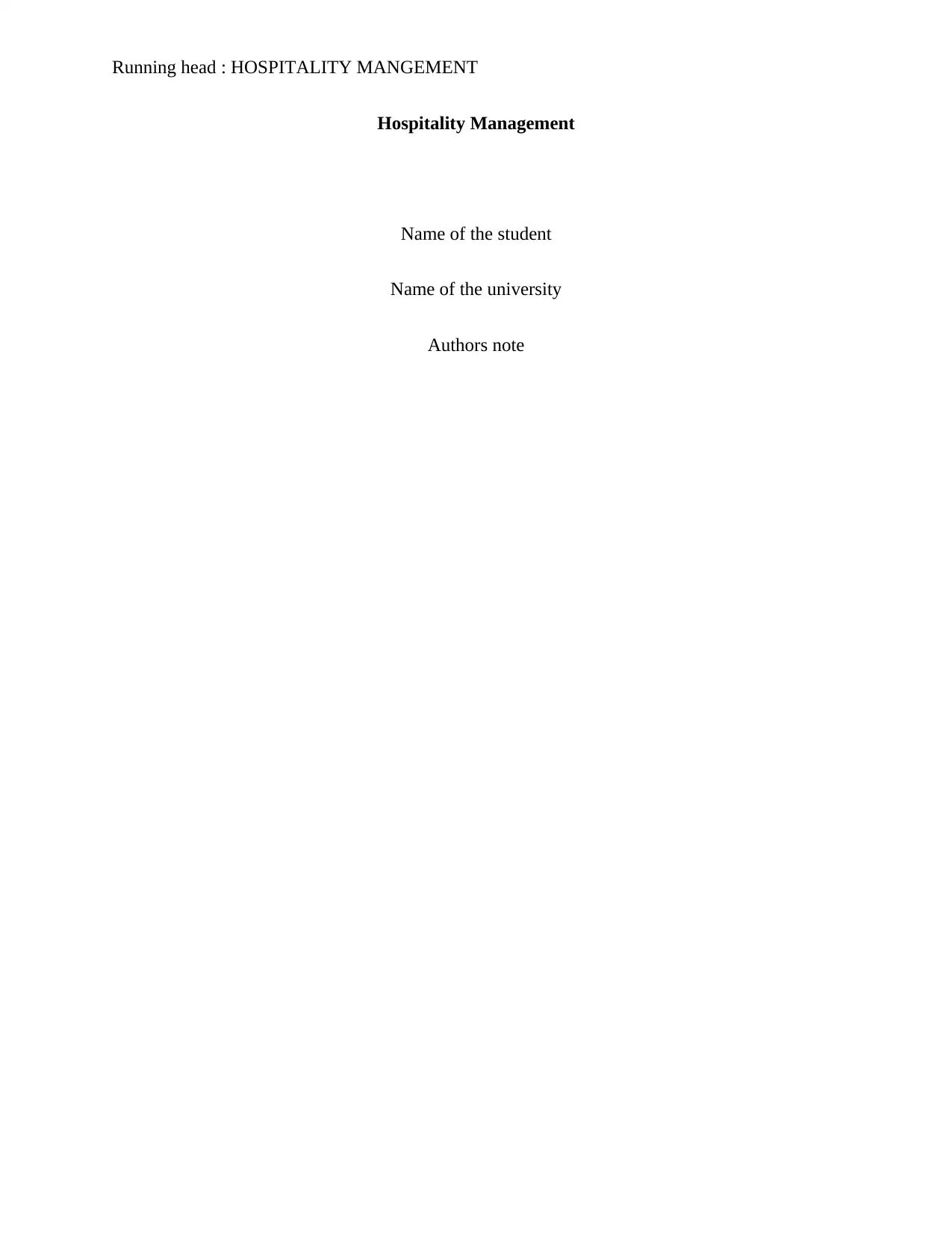
Running head : HOSPITALITY MANGEMENT
Hospitality Management
Name of the student
Name of the university
Authors note
Hospitality Management
Name of the student
Name of the university
Authors note
Paraphrase This Document
Need a fresh take? Get an instant paraphrase of this document with our AI Paraphraser
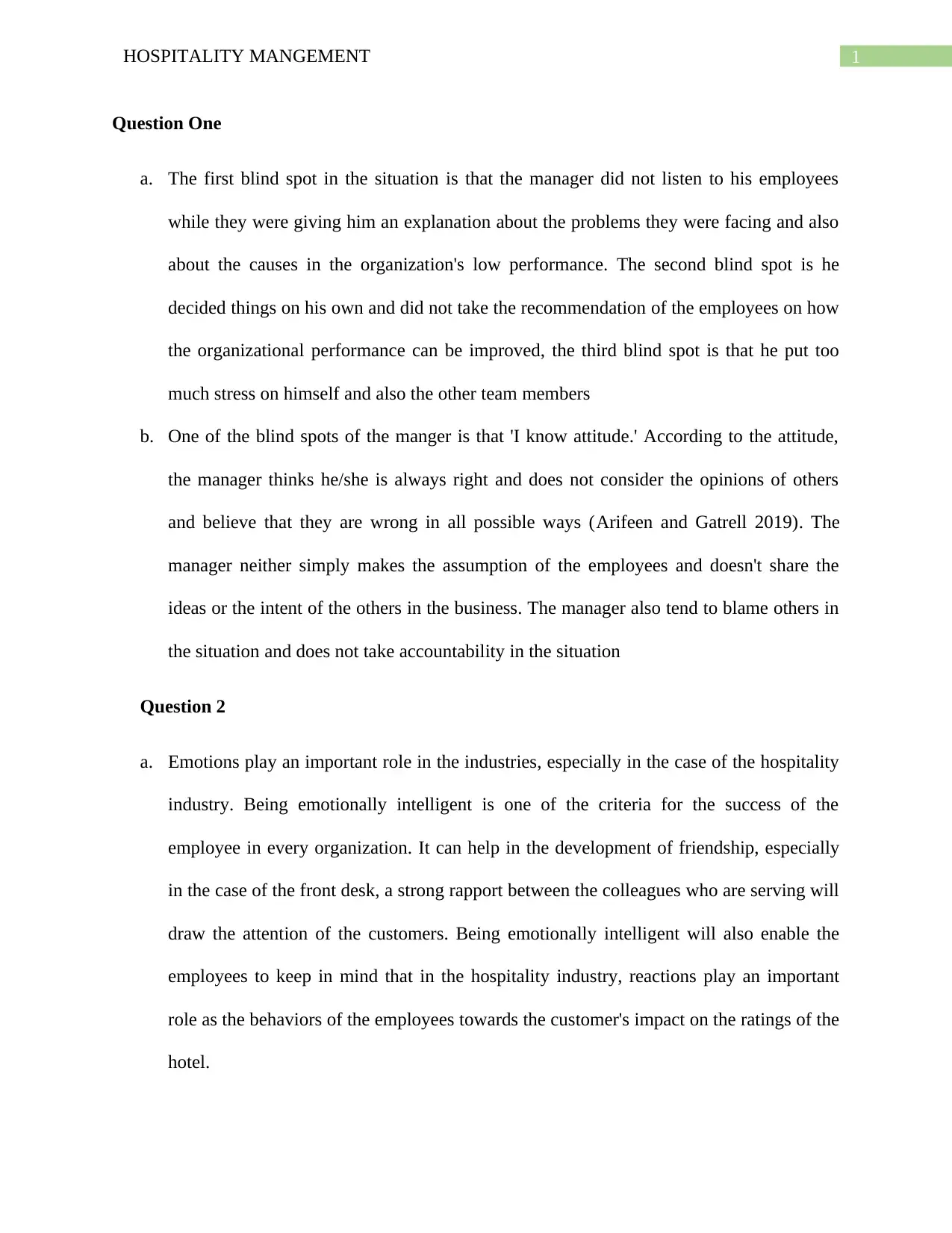
1HOSPITALITY MANGEMENT
Question One
a. The first blind spot in the situation is that the manager did not listen to his employees
while they were giving him an explanation about the problems they were facing and also
about the causes in the organization's low performance. The second blind spot is he
decided things on his own and did not take the recommendation of the employees on how
the organizational performance can be improved, the third blind spot is that he put too
much stress on himself and also the other team members
b. One of the blind spots of the manger is that 'I know attitude.' According to the attitude,
the manager thinks he/she is always right and does not consider the opinions of others
and believe that they are wrong in all possible ways (Arifeen and Gatrell 2019). The
manager neither simply makes the assumption of the employees and doesn't share the
ideas or the intent of the others in the business. The manager also tend to blame others in
the situation and does not take accountability in the situation
Question 2
a. Emotions play an important role in the industries, especially in the case of the hospitality
industry. Being emotionally intelligent is one of the criteria for the success of the
employee in every organization. It can help in the development of friendship, especially
in the case of the front desk, a strong rapport between the colleagues who are serving will
draw the attention of the customers. Being emotionally intelligent will also enable the
employees to keep in mind that in the hospitality industry, reactions play an important
role as the behaviors of the employees towards the customer's impact on the ratings of the
hotel.
Question One
a. The first blind spot in the situation is that the manager did not listen to his employees
while they were giving him an explanation about the problems they were facing and also
about the causes in the organization's low performance. The second blind spot is he
decided things on his own and did not take the recommendation of the employees on how
the organizational performance can be improved, the third blind spot is that he put too
much stress on himself and also the other team members
b. One of the blind spots of the manger is that 'I know attitude.' According to the attitude,
the manager thinks he/she is always right and does not consider the opinions of others
and believe that they are wrong in all possible ways (Arifeen and Gatrell 2019). The
manager neither simply makes the assumption of the employees and doesn't share the
ideas or the intent of the others in the business. The manager also tend to blame others in
the situation and does not take accountability in the situation
Question 2
a. Emotions play an important role in the industries, especially in the case of the hospitality
industry. Being emotionally intelligent is one of the criteria for the success of the
employee in every organization. It can help in the development of friendship, especially
in the case of the front desk, a strong rapport between the colleagues who are serving will
draw the attention of the customers. Being emotionally intelligent will also enable the
employees to keep in mind that in the hospitality industry, reactions play an important
role as the behaviors of the employees towards the customer's impact on the ratings of the
hotel.
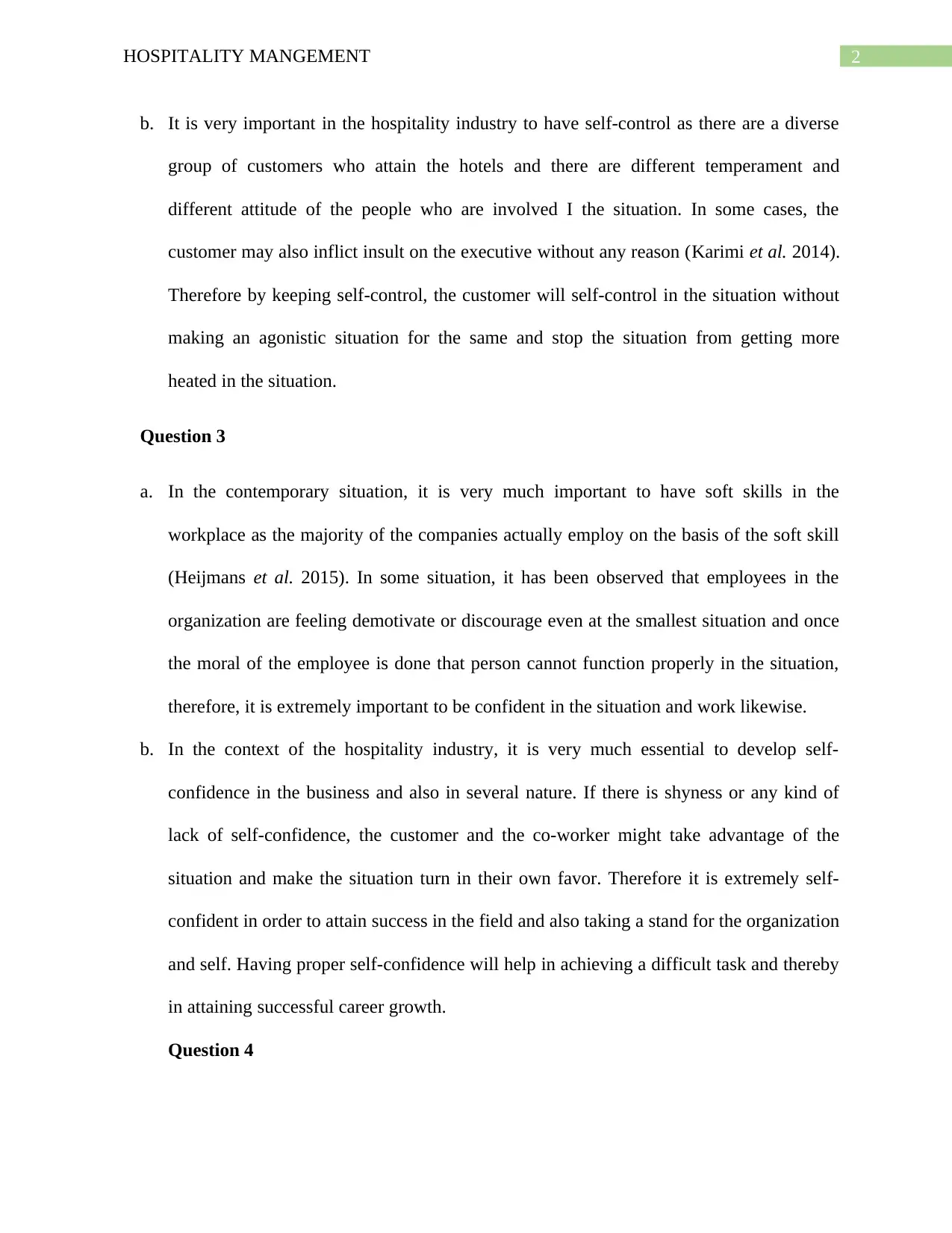
2HOSPITALITY MANGEMENT
b. It is very important in the hospitality industry to have self-control as there are a diverse
group of customers who attain the hotels and there are different temperament and
different attitude of the people who are involved I the situation. In some cases, the
customer may also inflict insult on the executive without any reason (Karimi et al. 2014).
Therefore by keeping self-control, the customer will self-control in the situation without
making an agonistic situation for the same and stop the situation from getting more
heated in the situation.
Question 3
a. In the contemporary situation, it is very much important to have soft skills in the
workplace as the majority of the companies actually employ on the basis of the soft skill
(Heijmans et al. 2015). In some situation, it has been observed that employees in the
organization are feeling demotivate or discourage even at the smallest situation and once
the moral of the employee is done that person cannot function properly in the situation,
therefore, it is extremely important to be confident in the situation and work likewise.
b. In the context of the hospitality industry, it is very much essential to develop self-
confidence in the business and also in several nature. If there is shyness or any kind of
lack of self-confidence, the customer and the co-worker might take advantage of the
situation and make the situation turn in their own favor. Therefore it is extremely self-
confident in order to attain success in the field and also taking a stand for the organization
and self. Having proper self-confidence will help in achieving a difficult task and thereby
in attaining successful career growth.
Question 4
b. It is very important in the hospitality industry to have self-control as there are a diverse
group of customers who attain the hotels and there are different temperament and
different attitude of the people who are involved I the situation. In some cases, the
customer may also inflict insult on the executive without any reason (Karimi et al. 2014).
Therefore by keeping self-control, the customer will self-control in the situation without
making an agonistic situation for the same and stop the situation from getting more
heated in the situation.
Question 3
a. In the contemporary situation, it is very much important to have soft skills in the
workplace as the majority of the companies actually employ on the basis of the soft skill
(Heijmans et al. 2015). In some situation, it has been observed that employees in the
organization are feeling demotivate or discourage even at the smallest situation and once
the moral of the employee is done that person cannot function properly in the situation,
therefore, it is extremely important to be confident in the situation and work likewise.
b. In the context of the hospitality industry, it is very much essential to develop self-
confidence in the business and also in several nature. If there is shyness or any kind of
lack of self-confidence, the customer and the co-worker might take advantage of the
situation and make the situation turn in their own favor. Therefore it is extremely self-
confident in order to attain success in the field and also taking a stand for the organization
and self. Having proper self-confidence will help in achieving a difficult task and thereby
in attaining successful career growth.
Question 4
⊘ This is a preview!⊘
Do you want full access?
Subscribe today to unlock all pages.

Trusted by 1+ million students worldwide
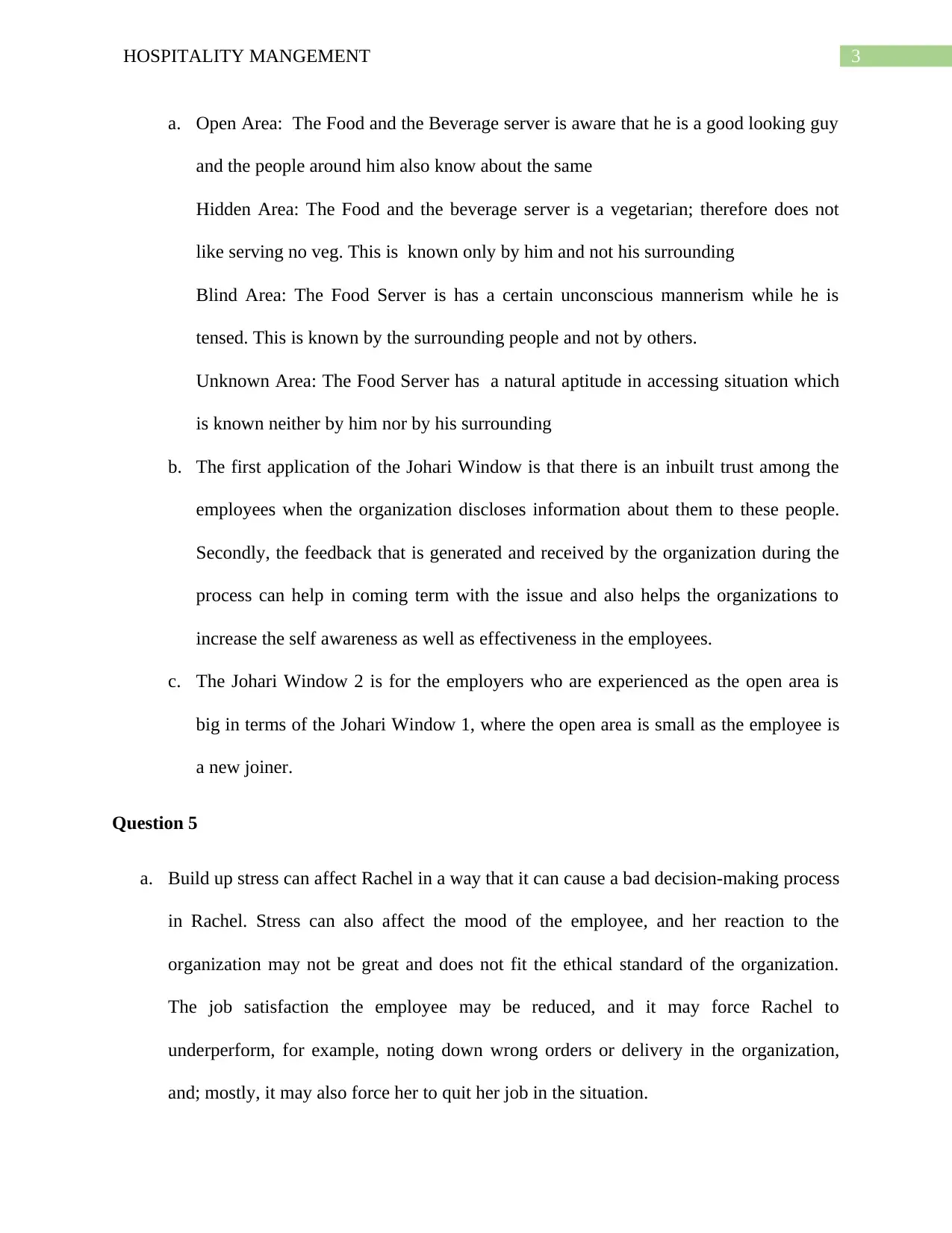
3HOSPITALITY MANGEMENT
a. Open Area: The Food and the Beverage server is aware that he is a good looking guy
and the people around him also know about the same
Hidden Area: The Food and the beverage server is a vegetarian; therefore does not
like serving no veg. This is known only by him and not his surrounding
Blind Area: The Food Server is has a certain unconscious mannerism while he is
tensed. This is known by the surrounding people and not by others.
Unknown Area: The Food Server has a natural aptitude in accessing situation which
is known neither by him nor by his surrounding
b. The first application of the Johari Window is that there is an inbuilt trust among the
employees when the organization discloses information about them to these people.
Secondly, the feedback that is generated and received by the organization during the
process can help in coming term with the issue and also helps the organizations to
increase the self awareness as well as effectiveness in the employees.
c. The Johari Window 2 is for the employers who are experienced as the open area is
big in terms of the Johari Window 1, where the open area is small as the employee is
a new joiner.
Question 5
a. Build up stress can affect Rachel in a way that it can cause a bad decision-making process
in Rachel. Stress can also affect the mood of the employee, and her reaction to the
organization may not be great and does not fit the ethical standard of the organization.
The job satisfaction the employee may be reduced, and it may force Rachel to
underperform, for example, noting down wrong orders or delivery in the organization,
and; mostly, it may also force her to quit her job in the situation.
a. Open Area: The Food and the Beverage server is aware that he is a good looking guy
and the people around him also know about the same
Hidden Area: The Food and the beverage server is a vegetarian; therefore does not
like serving no veg. This is known only by him and not his surrounding
Blind Area: The Food Server is has a certain unconscious mannerism while he is
tensed. This is known by the surrounding people and not by others.
Unknown Area: The Food Server has a natural aptitude in accessing situation which
is known neither by him nor by his surrounding
b. The first application of the Johari Window is that there is an inbuilt trust among the
employees when the organization discloses information about them to these people.
Secondly, the feedback that is generated and received by the organization during the
process can help in coming term with the issue and also helps the organizations to
increase the self awareness as well as effectiveness in the employees.
c. The Johari Window 2 is for the employers who are experienced as the open area is
big in terms of the Johari Window 1, where the open area is small as the employee is
a new joiner.
Question 5
a. Build up stress can affect Rachel in a way that it can cause a bad decision-making process
in Rachel. Stress can also affect the mood of the employee, and her reaction to the
organization may not be great and does not fit the ethical standard of the organization.
The job satisfaction the employee may be reduced, and it may force Rachel to
underperform, for example, noting down wrong orders or delivery in the organization,
and; mostly, it may also force her to quit her job in the situation.
Paraphrase This Document
Need a fresh take? Get an instant paraphrase of this document with our AI Paraphraser
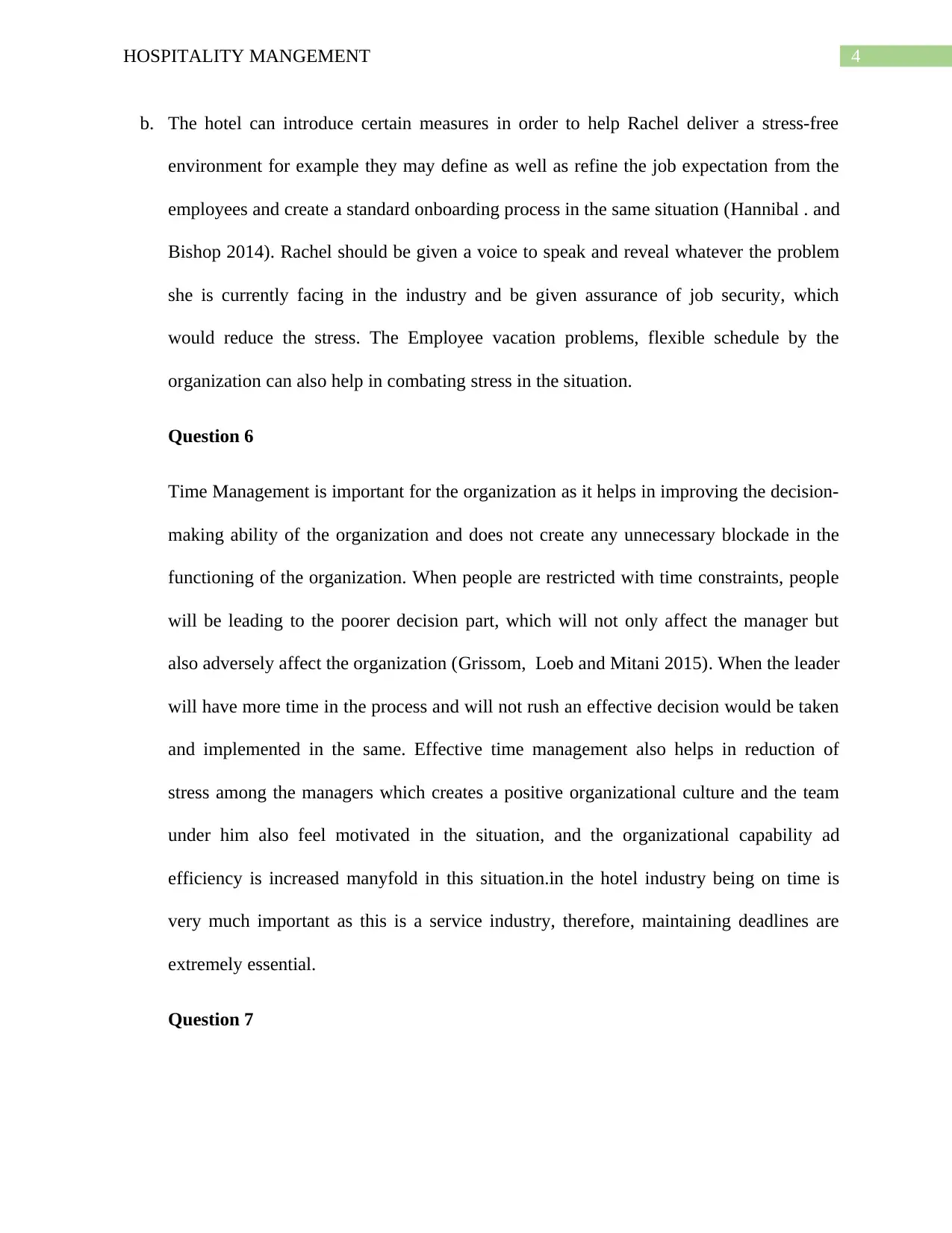
4HOSPITALITY MANGEMENT
b. The hotel can introduce certain measures in order to help Rachel deliver a stress-free
environment for example they may define as well as refine the job expectation from the
employees and create a standard onboarding process in the same situation (Hannibal . and
Bishop 2014). Rachel should be given a voice to speak and reveal whatever the problem
she is currently facing in the industry and be given assurance of job security, which
would reduce the stress. The Employee vacation problems, flexible schedule by the
organization can also help in combating stress in the situation.
Question 6
Time Management is important for the organization as it helps in improving the decision-
making ability of the organization and does not create any unnecessary blockade in the
functioning of the organization. When people are restricted with time constraints, people
will be leading to the poorer decision part, which will not only affect the manager but
also adversely affect the organization (Grissom, Loeb and Mitani 2015). When the leader
will have more time in the process and will not rush an effective decision would be taken
and implemented in the same. Effective time management also helps in reduction of
stress among the managers which creates a positive organizational culture and the team
under him also feel motivated in the situation, and the organizational capability ad
efficiency is increased manyfold in this situation.in the hotel industry being on time is
very much important as this is a service industry, therefore, maintaining deadlines are
extremely essential.
Question 7
b. The hotel can introduce certain measures in order to help Rachel deliver a stress-free
environment for example they may define as well as refine the job expectation from the
employees and create a standard onboarding process in the same situation (Hannibal . and
Bishop 2014). Rachel should be given a voice to speak and reveal whatever the problem
she is currently facing in the industry and be given assurance of job security, which
would reduce the stress. The Employee vacation problems, flexible schedule by the
organization can also help in combating stress in the situation.
Question 6
Time Management is important for the organization as it helps in improving the decision-
making ability of the organization and does not create any unnecessary blockade in the
functioning of the organization. When people are restricted with time constraints, people
will be leading to the poorer decision part, which will not only affect the manager but
also adversely affect the organization (Grissom, Loeb and Mitani 2015). When the leader
will have more time in the process and will not rush an effective decision would be taken
and implemented in the same. Effective time management also helps in reduction of
stress among the managers which creates a positive organizational culture and the team
under him also feel motivated in the situation, and the organizational capability ad
efficiency is increased manyfold in this situation.in the hotel industry being on time is
very much important as this is a service industry, therefore, maintaining deadlines are
extremely essential.
Question 7
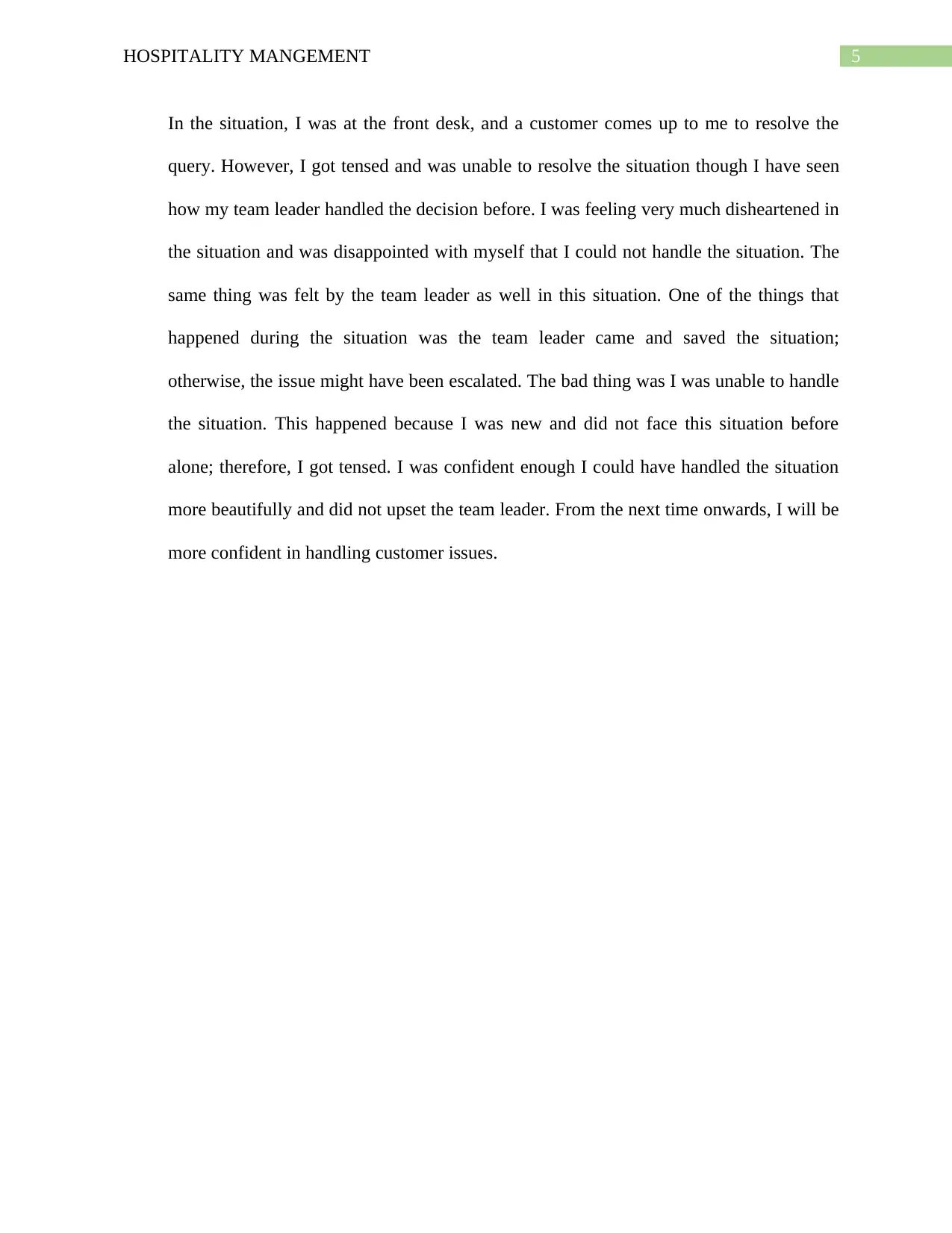
5HOSPITALITY MANGEMENT
In the situation, I was at the front desk, and a customer comes up to me to resolve the
query. However, I got tensed and was unable to resolve the situation though I have seen
how my team leader handled the decision before. I was feeling very much disheartened in
the situation and was disappointed with myself that I could not handle the situation. The
same thing was felt by the team leader as well in this situation. One of the things that
happened during the situation was the team leader came and saved the situation;
otherwise, the issue might have been escalated. The bad thing was I was unable to handle
the situation. This happened because I was new and did not face this situation before
alone; therefore, I got tensed. I was confident enough I could have handled the situation
more beautifully and did not upset the team leader. From the next time onwards, I will be
more confident in handling customer issues.
In the situation, I was at the front desk, and a customer comes up to me to resolve the
query. However, I got tensed and was unable to resolve the situation though I have seen
how my team leader handled the decision before. I was feeling very much disheartened in
the situation and was disappointed with myself that I could not handle the situation. The
same thing was felt by the team leader as well in this situation. One of the things that
happened during the situation was the team leader came and saved the situation;
otherwise, the issue might have been escalated. The bad thing was I was unable to handle
the situation. This happened because I was new and did not face this situation before
alone; therefore, I got tensed. I was confident enough I could have handled the situation
more beautifully and did not upset the team leader. From the next time onwards, I will be
more confident in handling customer issues.
⊘ This is a preview!⊘
Do you want full access?
Subscribe today to unlock all pages.

Trusted by 1+ million students worldwide
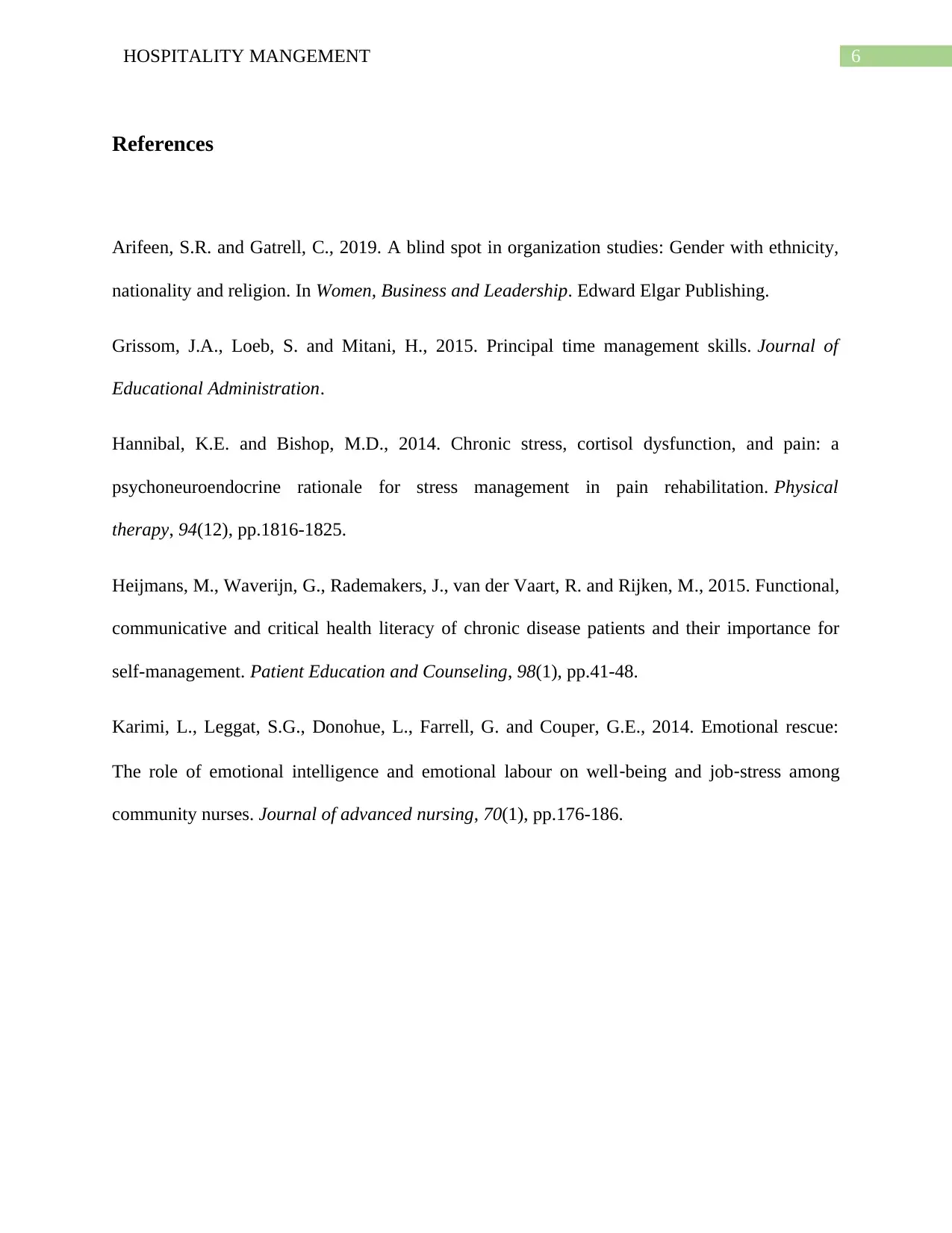
6HOSPITALITY MANGEMENT
References
Arifeen, S.R. and Gatrell, C., 2019. A blind spot in organization studies: Gender with ethnicity,
nationality and religion. In Women, Business and Leadership. Edward Elgar Publishing.
Grissom, J.A., Loeb, S. and Mitani, H., 2015. Principal time management skills. Journal of
Educational Administration.
Hannibal, K.E. and Bishop, M.D., 2014. Chronic stress, cortisol dysfunction, and pain: a
psychoneuroendocrine rationale for stress management in pain rehabilitation. Physical
therapy, 94(12), pp.1816-1825.
Heijmans, M., Waverijn, G., Rademakers, J., van der Vaart, R. and Rijken, M., 2015. Functional,
communicative and critical health literacy of chronic disease patients and their importance for
self-management. Patient Education and Counseling, 98(1), pp.41-48.
Karimi, L., Leggat, S.G., Donohue, L., Farrell, G. and Couper, G.E., 2014. Emotional rescue:
The role of emotional intelligence and emotional labour on well‐being and job‐stress among
community nurses. Journal of advanced nursing, 70(1), pp.176-186.
References
Arifeen, S.R. and Gatrell, C., 2019. A blind spot in organization studies: Gender with ethnicity,
nationality and religion. In Women, Business and Leadership. Edward Elgar Publishing.
Grissom, J.A., Loeb, S. and Mitani, H., 2015. Principal time management skills. Journal of
Educational Administration.
Hannibal, K.E. and Bishop, M.D., 2014. Chronic stress, cortisol dysfunction, and pain: a
psychoneuroendocrine rationale for stress management in pain rehabilitation. Physical
therapy, 94(12), pp.1816-1825.
Heijmans, M., Waverijn, G., Rademakers, J., van der Vaart, R. and Rijken, M., 2015. Functional,
communicative and critical health literacy of chronic disease patients and their importance for
self-management. Patient Education and Counseling, 98(1), pp.41-48.
Karimi, L., Leggat, S.G., Donohue, L., Farrell, G. and Couper, G.E., 2014. Emotional rescue:
The role of emotional intelligence and emotional labour on well‐being and job‐stress among
community nurses. Journal of advanced nursing, 70(1), pp.176-186.
1 out of 7
Related Documents
Your All-in-One AI-Powered Toolkit for Academic Success.
+13062052269
info@desklib.com
Available 24*7 on WhatsApp / Email
![[object Object]](/_next/static/media/star-bottom.7253800d.svg)
Unlock your academic potential
Copyright © 2020–2026 A2Z Services. All Rights Reserved. Developed and managed by ZUCOL.





